
From left medica: Saferia Bushi, Bernard Kadima, John Njunge, Bancy Wanjira and Dennis Nyabuto.
Despite making sacrifices, medics say that the government's promise of permanent employment remains unfulfilled five years later. Daily Nation spoke to some health service providers:
Ronald Maiyo- Elgeyo-Marakwet UHC nurse
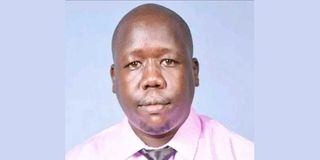
Ronald Maiyo.
My name is Ronald Maiyo, a nurse recruited by the Ministry of Health in 2020 to battle Covid-19 in Elgeyo Marakwet County. Posted to an isolation facility, I witnessed endless death and despair—images that still haunt my nights.
I cared for coronavirus patients until I contracted the virus myself, enduring two weeks of quarantine away from my family. Despite this sacrifice, we went unpaid for six months while working alongside better-compensated colleagues who received COVID-19 allowances yet were exempted from isolation wards.
Our situation has only deteriorated. We work on contract terms with half-pay, no allowances, no salary increases, yet face all standard deductions. Meanwhile, county governments continually advertise health positions that exclude UHC program staff, preferring fresh graduates over our experienced team.
Our numbers have dwindled to fewer than 8,500 by 2025. We have lost 45 colleagues over five years—many to suicide triggered by depression, others on the frontlines, to natural causes, or accidents.
When I request study leave, I'm told contract workers aren't eligible. For training seminars, permanent staff are selected while UHC employees are overlooked.
What pains me most is that five years after our sacrifices, the government's promises of permanent employment with pension benefits and gratuity remain unfulfilled. We continue working with the trauma of the pandemic while being treated as disposable.
All we ask is for the government to honor its commitment to those who risked everything when Kenya needed us most.
Apusa Ochieng – Migori County nurse

Apusa Ochieng.
Working shoulder to shoulder with permanent staff often exceeding their hours, yet receiving just a fraction of their pay, captures the daily injustice we face. Despite confronting the same workplace hazards in hospital settings, our paychecks arrive without the risk allowance yet we all work under dangerous set ups.
The inequality extends beyond compensation. As a Kenya Registered Community Health Nurse, I watch my county colleagues receive annual uniform allowances, enabling them to maintain a professional appearance with fresh, crisp attire.
Meanwhile, we UHC staff have no such provision. We report to duty in faded, worn uniforms—sometimes none at all, only to face reprimands from supervisors who fail to understand that our meagre salaries make uniforms an unaffordable luxury.
The contradiction deepens when we're thrust into managerial roles despite our inadequate compensation. Refuse these additional responsibilities, and disciplinary action swiftly follows - a show-cause letter becomes your companion.
When seeking permanent positions within counties, our experience counts for nothing. The Ministry of Health trumpets success stories of "absorbed" UHC workers, but this narrative conceals an ugly truth: these colleagues secured positions only after paying substantial bribes. This isn't absorption - it's exploitation.
This sustained mistreatment has pushed many of us into depression, yet we cannot afford the very medications needed to treat it. For five years, life has been an unrelenting struggle - imagine purchasing even water for household needs in areas without piped supplies. The mental anguish we endure is known only to God.
I wonder how President William Ruto, himself a parent, sleeps peacefully while subjecting other people's children to such treatment. We fought tirelessly to protect this nation during a deadly pandemic. Now it's time for Kenya to fight for us.
Jackline Nderitu- Nakuru County clinical officer

Jackline Nderitu.
I stand alone as the sole provider for my two children since losing my husband in 2022, a burden growing increasingly unbearable due to inadequate pay and withheld gratuity after five years of dedicated service.
During three grueling years on COVID-19 frontlines, I contracted the virus four times. Today, I battle the persistent aftermath of long COVID, including devastating memory lapses, while simultaneously struggling to keep my family from slipping deeper into poverty. Each day becomes a desperate exercise in survival.
Is this Kenya's gratitude for healthcare workers who risked everything to guide our nation through its darkest pandemic hours?
How can President Ruto justify spending billions on State House renovations, a non-essential luxury, while allocating Sh1.14 billion for 17 presidential advisors? These extravagant expenditures continue while we, who saved countless Kenyan lives, spiral into depression and financial ruin.
The hypocrisy cuts deeper as Health CS Aden Duale attends the World Health Assembly in Geneva, accompanied by an entourage of 60 officials, including both Principal Secretaries. They willingly spend millions on international travel, yet draw a hard line at honoring commitments to frontline workers.
My professional growth has stagnated completely. I've been unable to develop any sustainable projects or investments. Most heartbreaking of all, my children sit at home, denied education because I cannot afford their school fees.
Depression has become my silent companion, one I dare not acknowledge openly when I am expected to provide vital healthcare services daily. The solution is straightforward: pay the gratuity we've earned and fulfil the promise of permanent employment with pension benefits. Only then might I reclaim some semblance of a normal life after all I've sacrificed for Kenya.
Saferia Bushi-Mombasa County lab technologist
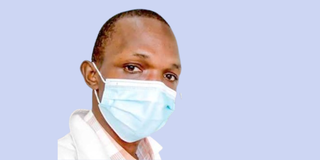
Saferia Bushi.
Some of my memorable moment is when I was newly deployed as a staff in one of the laboratories in Mombasa. I was nicknamed ‘Covid staff’.
Anything that arises in the name of Covid I was fronted as the first option.
One day after properly decontaminating from the isolation ward, my own colleague denied me entry to the lab, saying 'nisiwaletee corona' (don't bring us corona).
It was deeply traumatising, yet I never refused to serve when called.
Now, shamefully, our government has forgotten us quickly, treating us like trash and seeking a better septic tank to dump us in forever.
David Singili- Vihiga County community health extension worker
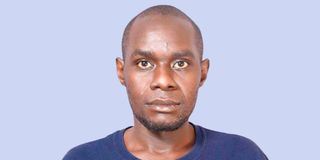
David Singili.
Just one month into service, I was assigned to enforce Covid-19 protocols in a village receiving a coronavirus victim's body from Mombasa.
During the pandemic's peak, when most healthcare workers avoided such cases or worked from home, I, as the officer in charge, was sent to ensure protocols were followed, against the community's wishes and cultural practices.
The entire community and family were hostile until the local administration intervened.
Now, despite enduring horror, death, and pain in government service, we're abandoned with only a stipend, no career progression, and none of the privileges our permanent colleagues enjoy, after being led in circles by four health ministers.
John Njung’e Kiambu County nutritionist
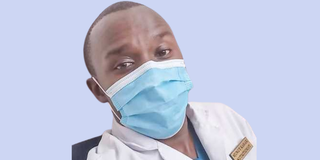
John Njung'e.
I contracted Covid-19 twice while working at Thika Level 5 Hospital since 2020.
My job ensured COVID patients received nutritious diets to boost immunity and recovery.
Ward rounds were terrifying as the pain and hopelessness, especially initially, was overwhelming.
Despite recovering from coronavirus, I returned to the same section.
Receiving almost a quarter of what our permanent counterparts earn is both discouraging and heartbreaking, despite facing identical statutory deductions. Are we children of a lesser God, Mr. President?
Kavita Mutua, Radiographer, Makueni County
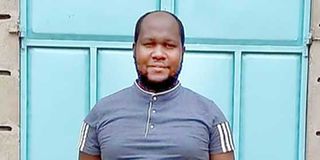
Kavita Mutua.
Since joining Kilungu Sub-County Hospital as a radiographer under the UHC program in June 2020, I've suffered mentally, emotionally, and financially.
The government pays me a stipend that cannot meet my family's needs, pushing me toward depression. I have stagnated in the same job group for five years, earning half the Salaries and Remuneration Commission's recommended rate.
I cannot pursue promotion, further education, or access loans for development, despite time not being on my side.
Working alongside equally qualified colleagues who earn full salaries for identical work is heartbreaking.
The government should pay my gratuity that was due after my first three years. Why must we camp at Afya House to demand what's rightfully ours?
Bernard Kadima -Busia County medical laboratory scientist
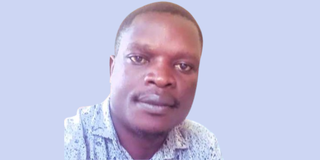
Bernard Kadima.
I was hired among over 8500 health care workers on UHC program, during the surge of the deadly coronavirus.
As a medical laboratory scientist, I risked my life to help Kenyans in diagnosis and sample collection at Busia border point.
As healthcare workers under the UHC program, we hoped that the government would reassess our service terms as a gesture of appreciation post-pandemic. We were mindful of the challenging economic circumstances brought about by the pandemic at the time of deployment; hence, we prioritized putting lives first.
Nevertheless, we selflessly offered our services as patriotic citizens. Little did we anticipate the ensuing struggles, culminating in protests and urging the government to honour its promises.
An agreement was signed during the’ Kericho Declaration’ last year that our terms shall be transitioned to permanent.
Our hope was that the government will absorb us in permanent service but now we are left in a limbo.
My appeal is to President Ruto, come to our rescue.
Dennis Nyabuto-Marsabit County laboratory officer
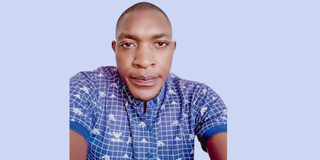
Dennis Nyabuto.
Working at North Horr Health Center in Marsabit for five years under the UHC contract has been hell on earth.
My Sh50,000 stipend, reduced to Sh39,000 after deductions, must cover my HELB loan, rent for my family in Nairobi, my accommodation, and my sibling's university education.
North Horr is an extreme hardship area, 16 hours by road from Nairobi, costing Sh4,000 one-way, with basics extremely expensive due to the 200km desert journey to Marsabit town.
County colleagues earn significantly more plus hardship allowances nearly equal to my entire income. I'm the only laboratory technician serving 14,000 people, working day and night shifts alone.
Bancy Wanjira Kariuki- Kirinyaga County clinical officer

Bancy Wanjira Kariuki.
When I got my UHC contract I was heavily pregnant.
That did not stop me from going to the frontlines to fight coronavirus and save Kenyans because it was all hands-on deck at the time.
I would end up contracting the virus and getting sick to a point that I almost died.
I worked tirelessly despite the limited resources like medications and personal protective equipment which was the reason I would later infect my son and husband.
We thought we would lose our lives.
In addition, I lost many patients and some colleagues to coronavirus in 2020 and the emotional grief and trauma I endured is something I never wish even for my worst enemy because to date it keeps me awake at night.
It would therefore be really fair for us to be absorbed to permanent and pensionable terms and to be paid our gratuity.






